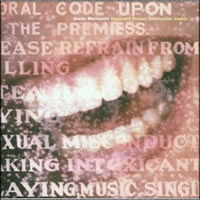“tinkerbell tendencies and gypsy garage-sale ways”
Artist: Alanis Morissette
Album: Supposed Former Infatuation Junkie
If you know just a little about Alanis Morissette‘s music, you’ll probably know Jagged Little Pill, her 1995 debut. It sold 33 million copies, spawned six hit singles, and pioneered an easy-to-mainstream sound – earnest folk-pop with drum loops – that  I doubt I can convince you was briefly innovative. (It was, although I felt the music was also self-cannibalizing in a way that would not have sustained a second album.)
I doubt I can convince you was briefly innovative. (It was, although I felt the music was also self-cannibalizing in a way that would not have sustained a second album.)
It was, in my opinion, a striking debut, in my top ten for its year. I found her voice commanding and thrilling, although it has a nails-on-chalkboard effect for, e.g., my wife and my mom, and its relationship to correct pitch was, if mostly good, prone to sudden conflicts. It got pigeonholed as an “angry” album because one of the only two angry songs on it, You Oughtta Know, was its breakout single. It got pigeonholed by the same people who didn’t complain about her use of the word “ironic” until Ironic was released as the third single – people who enjoyed jumping to harsh conclusions about a 20-year-old woman based on little data, basically – but I admired the album’s dominant moods of empathy, introspection, kindness, and careful, worked-out optimism. Jagged Little Pill was a forceful, honest album by the kind of young woman who paid more attention to how “irony” is defined in Houghton Mifflin textbooks – there’s three listed kinds, guys, “dramatic”, “situational”, and “curling” – than her critics did. Ironic, dontcha think?
Supposed Former Infatuation Junkie was released three-and-a-half years after the debut, much of it filled with vague press accounts of Morissette’s battle against the record executives for control of her career. The long awkward title, and the 17-song, 72-minute track listing, made it immediately clear who had won. While it’s still a pop/rock album – a detailed one, full of glimmers and flares around the edges where there could have been blur or nothing – only three of the songs, considered as music alone, would have fit smoothly onto her debut (Thank U, Can’t Not, Joining You).
A few songs were atypically fragile, or meandering and story-driven, while several more went the other way. The drum programs and processed bass guitar and synth noises sometimes reach denseness and aggression levels ranging from the thickest soundscapes of Tori Amos’s From the Choirgirl Hotel, through Baba‘s Indian-styled melody and sculpted feedback shrapnel, to songs that could have been remixed into Skinny Puppy bonus tracks, if only Alanis’s voice were removed. Granted, that Skinny Puppy analogy is the logical equivalent of “many Playboy centerfolds would make great Architectural Digest spreads if only the damn woman was out of the way”.
Sometimes, on Junkie, she sang in convoluted free-verse that piled up for verses on end – and still she’d keep singing where the melody and instrumentation ran out, to squeeze in an “and supportive” or an “unfortunately you needed a health scare to reprioritize”. Sometimes she’d slow down, stretch two syllables across a measure … but on Front Row entire extra verses are sung, thickly processed, hidden underneath the main song. She was bounding across our big world trying to understand everything at once, and breathlessly to report back.
It’s full of songs in the forms of recalled conversations; of apologies and prayers; of relationship analyses. It has a thoughtful-if-panicky monologue in the persona of her father, and a detailed love letter to her mom. It has a passionate counter-argument (and shared memories) for a suicidal friend, even as she admits to seeing her friend’s point.
Morissette was not highly qualified to announce the great truths of her life, let alone ours. No 24-year-old is. If one ever could be, I suspect they’d spend less time on religion and therapy and self-help books, compared to the verifiable (and falsifiable) findings of anthropology and experimental psychology. But the urgent ambition to know and share everything; the announcement “let’s solve the world’s problems” as a climax of her peppiest, happiest dance song; her ending the entire album with “Feel free to call me a little more often”: those represent a spirit I cherish.
– Brian Block
